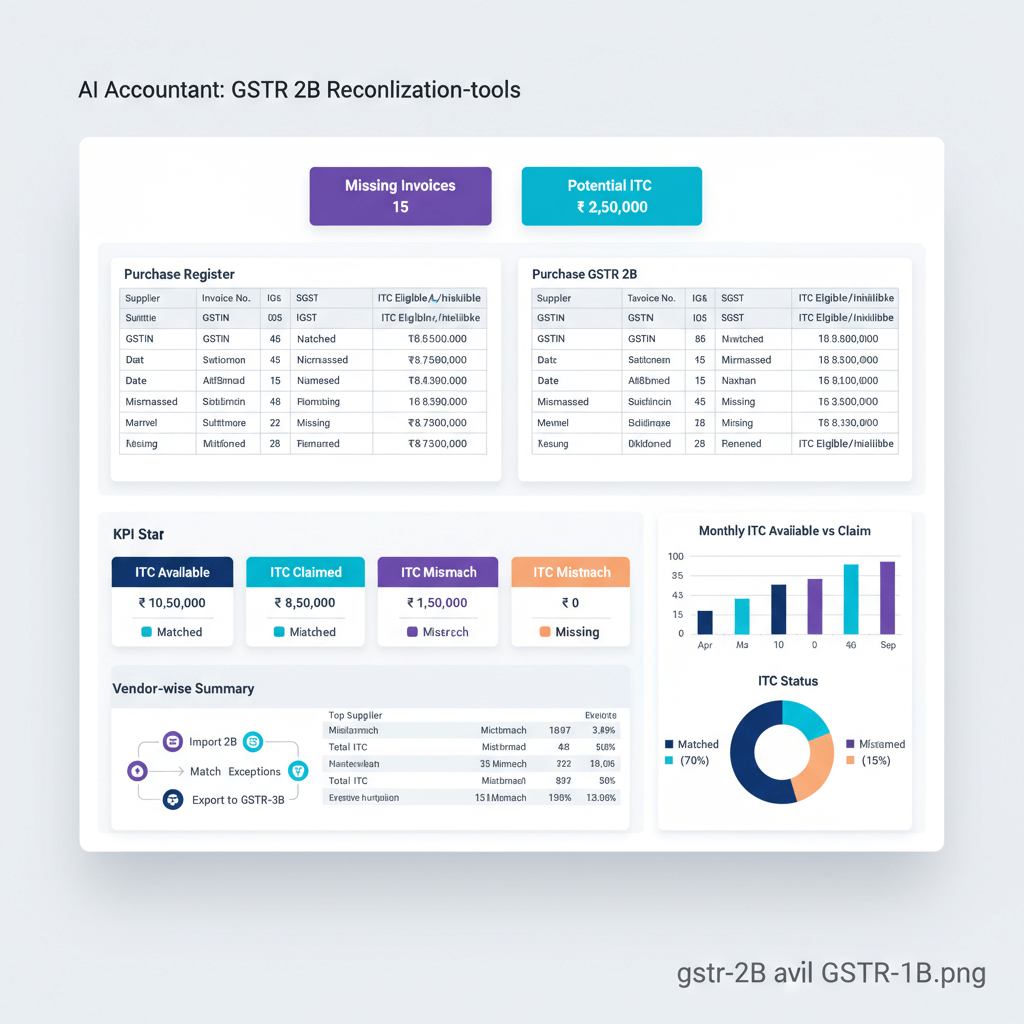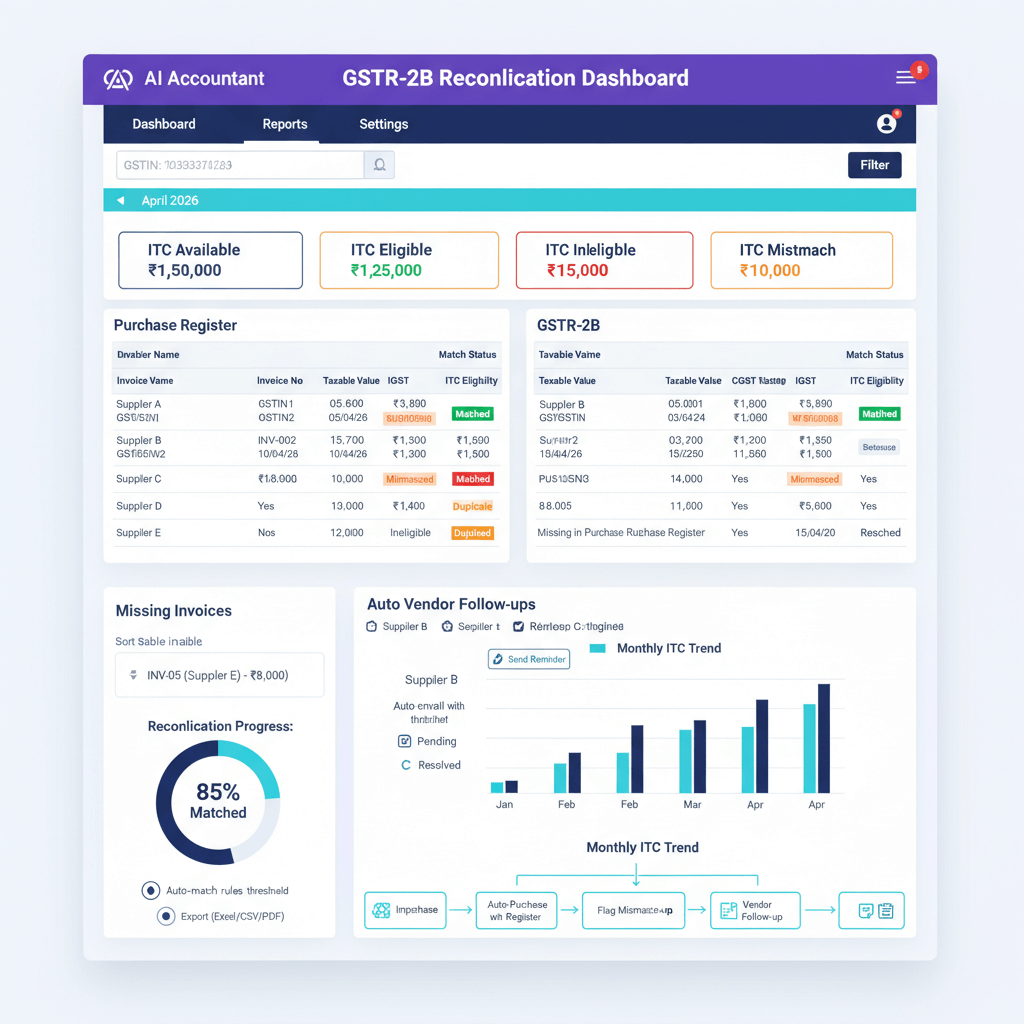Key Takeaways
- AI platforms automate data entry, GST, and TDS, freeing up 60–70% of manual bookkeeping time.
- Tally is the offline-first workhorse familiar to most CAs, but it lacks deep automation and remote collaboration.
- Zoho Books provides cloud-based collaboration and moderate automation, ideal for online-first SMEs.
- AI Accountant is built for Indian complexities, with OCR, NLP, real-time sync, and 80%+ automation coverage.
- CA firms can scale 3x more clients without proportional headcount increases by leveraging AI-driven workflows.
- Choosing the right tool depends on your need for stability (Tally), collaboration (Zoho Books), or advanced automation (AI Accountant).
Why AI Accounting Software Is Gaining Traction in India
Indian businesses face unique challenges that traditional bookkeeping simply can’t handle at scale. Consider this: a typical SMB processes hundreds of transactions monthly across multiple banks, each requiring GST classification, TDS calculations, and vendor matching. Doing this manually means your team spends the majority of its time on data entry rather than advisory work, introducing compliance risks.
Modern artificial intelligence can read bank statements in any format, predict the correct ledger entries, and even flag unusual transactions for review. This technological shift is explored in the Rise of AI tools in accounting article.
Platforms now automate reconciliation, GST and TDS processing, and real-time reporting, sharply reducing manual workload so professionals can focus on strategy and growth.
Platforms in Focus: Tally, Zoho Books, AI Accountant
Tally remains the industry standard for Indian SMEs and CAs. It’s highly trusted, offers simple offline-first workflows, and is renowned for compliance handling. Most accountants learned their trade on Tally, making it the familiar choice for traditional practices. Learn why it ranks among the most used accounting software in India and explore top Tally automation tools.
Zoho Books represents the modern, cloud-based approach. It offers easy integration with the broader Zoho suite, intuitive collaboration, and decent automation for standard workflows. Discover our Zoho Books automation tips.
AI Accountant is an AI-native platform specifically optimized for Indian accounting complexities. It automates ingestion, classification, TDS and GST returns, and bulk operations. For a deep dive, see the best AI accounting software in India guide and learn about intelligent ledger mapping.
Side by Side Feature Comparison Table
FeatureTallyZoho BooksAI AccountantBank Statement Ingestionmanual importautomatedautomated, multi bankLedger Mapping/Auto Postingmanual/macropartial automationAI & predictive autoGST & Tax Compliancestronggooddeep, India firstDashboarding/Insightsbasic/customizableadvanced, real timepredictive/real timeAR/AP Trackingmanualsemi automatedautomated, bulk opsAutomation Capabilitieslimitedmoderateadvanced, 80%+ coverageTDS & GSTR Integrationyesyesyes, automatedIntegration & Syncwith pluginsnative with Zoho1 click Tally/Zoho syncAI & Predictive Featuresnonelimitedcore strengthEase of Use / UXfamiliar, offlineintuitive, cloudmodern, onboardingIndian Workflow Supporthighmoderatedesigned for IndiaPricing Modelone time/annualsubscriptiontiered SAASIdeal User Profiletraditional SMB/CAdigital SME/CAscaling, automation led
Detailed Evaluation: Pros and Cons
Tally: The Trusted Workhorse
Pros:
- Ubiquitous in India, minimal learning curve.
- Robust offline workflows and audit readiness.
- Handles complex Indian tax scenarios with confidence.
Cons:
- Manual data entry becomes a bottleneck as volume increases.
- Offline design limits remote collaboration.
- Scaling requires proportional staffing increases.
Read why Tally works for accountants but fails CEOs.
Zoho Books: Modern and Connected
Pros:
- Cloud native, seamless integration with Zoho apps.
- Intuitive UI and real-time collaboration.
- Moderate automation for standard workflows.
Cons:
- Limited AI for deep Indian compliance.
- Struggles with intricate GST classification and TDS edge cases.
- Not sufficient to eliminate most manual tasks in CA firms.
Explore the AI accounting software India guide for more context.
AI Accountant: Built for Indian Complexity
Pros:
- Advanced OCR/NLP reads any Indian bank statement format.
- Real-time sync with Tally and Zoho Books.
- Predictive dashboards reduce bookkeeping time by 75%+.
Cons:
- Requires onboarding for AI-driven workflows.
- Feature set is growing, some modules still in development.
Get started with the bank statement OCR tool guide and see why it ranks among the best AI accounting software in India.
Use Cases by User Type
Chartered Accountants: Scale and Efficiency
CA firms need bulk client management, automated GST and TDS processing, and consolidated reporting. AI Accountant case studies show firms handling 3x more clients with the same team.
Small Business Owners: Simplicity and Insights
SMBs want easy invoicing, clear dashboards, and minimal setup. Zoho Books shines here, and Zoho Books GST filing automation adds compliance ease. AI Accountant combines deep automation with a user-friendly interface.
CFOs in SMBs: Real Time Reporting and Cash Flow
CFOs need live cash flow visibility and predictive insights. AI Accountant’s runway calculations and cash flow forecasting with AI in India empower faster strategic decisions.
Multi Entity Management: Bulk Operations
Larger practices and groups require consolidated workflows across entities. AI Accountant’s bulk classification and multi-company features deliver significant efficiency gains compared to separate manual processes.
User Reviews and Testimonial Trends
Tally: Reliability with Scale Limitations
Users praise Tally’s stability and audit readiness but note that scaling client work demands proportional increases in manual effort. See insights on the most used accounting software in India.
Zoho Books: Interface Excellence, Automation Gaps
Teams love the UI and integrations in Zoho Books, yet they encounter limitations with complex GST scenarios. Review the Zoho Books to Tally migration guide for more.
AI Accountant: Time Savings and Scale
Practitioners highlight dramatic time savings and the ability to maintain accuracy at high volumes. Read why it’s rated among the best AI accounting software in India.
Choosing the Best Platform for Your Needs
Your ideal choice depends on your priorities:
- Stability & Familiarity: Go with Tally if offline reliability is paramount.
- Collaboration & Cloud: Choose Zoho Books for team access and Zoho ecosystem integration.
- Advanced Automation: Opt for AI Accountant to maximize efficiency and scale without adding headcount.
FAQ
How can I compare Tally, Zoho Books, and AI Accountant for a mid-size CA firm?
List your requirements—volume of transactions, remote collaboration needs, and compliance complexity—and assess each platform’s automation. AI Accountant excels at high-volume, GST/TDS automation, while Tally offers offline stability and Zoho Books provides seamless cloud workflows.
What features should a CA look for in AI accounting software in India?
Key features include multi-bank statement ingestion, AI-driven ledger mapping, automated GST & TDS processing, real-time dashboards, and bulk operations. AI Accountant covers 80%+ automation of these tasks.
How does AI Accountant handle GST and TDS automation?
AI Accountant’s NLP engine classifies transactions, calculates TDS, prepares GSTR-1 and GSTR-3B drafts, and highlights exceptions for review. The process is up to 75% faster compared to manual filing.
Can AI Accountant ingest bank statements in Hindi or regional languages?
Yes, the platform’s OCR supports multiple Indian languages and formats—scanned PDFs, CSVs, and Excel—ensuring accurate classification regardless of statement language.
What is the learning curve for AI Accountant compared to Tally?
Tally is familiar to most accountants, but AI Accountant provides guided setup wizards and in-app tutorials. Most teams are productive within 2–3 days of onboarding.
How do I migrate existing Tally data into AI Accountant seamlessly?
Use the one-click Tally sync feature to import masters, vouchers, and opening balances. The platform then applies AI to classify historical transactions and align them with your chart of accounts.
How reliable are AI Accountant predictive dashboards for financial forecasting?
Dashboards use historical trends and machine learning models to forecast cash flow runway and vendor payment schedules. Many CFOs report confidence in 30- to 90-day forecasts with less manual analysis.
Can AI Accountant integrate with Zoho Books and Tally workflows?
Absolutely. It offers native connectors for Zoho Books and a sync plugin for Tally, allowing you to maintain existing ledgers while overlaying powerful AI automation.
What security and audit trail features does AI Accountant offer?
The platform includes role-based access controls, encrypted data storage, and detailed change logs. Every automated and manual entry is timestamped and linked to a user or AI process.
How can a CA scale operations with AI Accountant without increasing headcount?
By automating repetitive tasks—data entry, reconciliation, GST filing—AI Accountant frees up your team for advisory work. Practices have onboarded 3x more clients using the same staff levels.
-01%201.svg)





